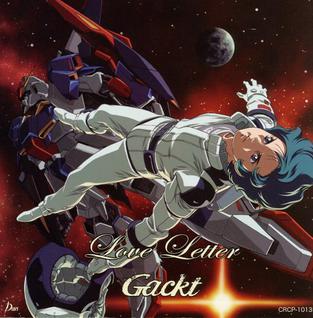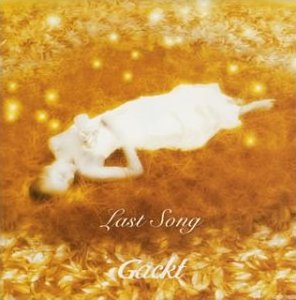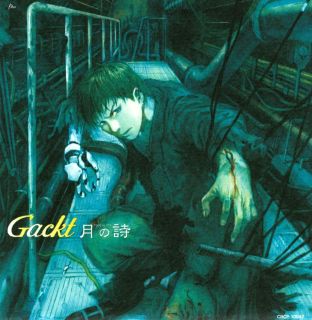
Mars is the first full-length studio album released by Japanese solo artist Gackt. It was released on April 26, 2000.

The Sixth Day: Single Collection is a compilation album released by Gackt on February 25, 2004. The album collects the artist's previous single's title songs, some of them having been re-recorded for this release. The Sixth Day complements The Seventh Night, an unplugged album released three months later.

The Seventh Night: Unplugged is a compilation album released by Gackt on May 26, 2004. It contains acoustic arrangements of previously released songs and complements The Sixth Day, a single collection released three months earlier. The unplugged theme of The Seventh Night would be continued by Gackt's subsequent album, Love Letter.

Moon is the third full-length studio album released by Japanese solo artist Gackt on June 19, 2002. Instead of a booklet, the album comes with a printed note by the artist, asking readers to "sense" the record's story, rather than analyzing the lyrics. The booklet was eventually included in the packaging of Moon's 2003 follow-up Crescent. Both albums are conceptually linked, as well as his more recent albums Diabolos and Last Moon from the "Moon Saga".

Crescent is the fourth full-length studio album released by Japanese solo artist Gackt on December 3, 2003. It is conceptually linked to its predecessor Moon and comes with booklets for both records. Crescent also features a duet with L'Arc-en-Ciel vocalist Hyde for "Orenji no Taiyou" with whom Gackt co-starred in the 2003 movie Moon Child.
Yuki Kuramochi, known professionally as Yuki, is a Japanese musician and singer-songwriter. She is best known as the lead vocalist for Judy and Mary. She founded Judy and Mary in 1991 and became a solo artist in 2002. She has also been a member of the bands NiNa and Mean Machine.

Love Letter is the fifth full-length studio album originally released by Japanese solo artist Gackt on February 14, 2005 in Japan.

"Redemption" is a single released by Japanese musician Gackt on January 25, 2006. Its songs "Redemption" and "Longing" were theme songs of the video game Dirge of Cerberus: Final Fantasy VII.

"Vanilla" is a second single released by Gackt on August 11, 1999. It peaked at fourth place on the Oricon Singles Chart and charted for ten weeks. It is Gackt's second best selling single, with 248,360 copies sold. "Vanilla" was re-released on March 20, 2002, when it peaked at number twelve and charted for 6 weeks. It was ceritifed gold by RIAJ.
The discography of the Japanese girl group Morning Musume consists of sixteen studio albums, five compilation albums, and seventy singles. Ever since its establishment in 1997, the group has experienced frequent line-up changes, and currently consists of twelve members: Mizuki Fukumura (leader), Erina Ikuta (sub-leader), Ayumi Ishida (sub-leader), Sakura Oda, Miki Nonaka, Maria Makino, Akane Haga, Reina Yokoyama, Rio Kitagawa, Homare Okamura, Mei Yamazaki and Rio Sakurai. The group was formed by Sharam Q vocalist Tsunku, who serves as their lyricist, composer, and producer.

"Metamorphoze" is a single released by Gackt on May 25, 2005 under Nippon Crown.

"Todokanai Ai to Shitteita no ni Osaekirezu ni Aishitsuzuketa..." is a single released by Gackt on August 10, 2005 under Nippon Crown.

"Love Letter" is a single released by Gackt on March 1, 2006 under Nippon Crown. It peaked at ninth place on the Oricon weekly chart and charted for seven weeks. The A-side and B-side were used in the Mobile Suit Zeta Gundam movie Love is the Pulse of the Stars, as opening and ending themes, respectively. "Dybbuk" also previously appeared on Gackt's 2003 album Crescent. It was certified gold by RIAJ.

"Last Song" is a single released by Gackt on November 12, 2003 under Nippon Crown. It peaked at fifth place on the Oricon weekly chart and charted for 13 weeks. It was certified gold by RIAJ. An unplugged piano-only version was recorded, and music video filmed, for The Seventh Night: Unplugged.

"Kimi ga Oikaketa Yume" (君が追いかけた夢) is a single released by Gackt on March 19, 2003 under Nippon Crown. It peaked at second place on the Oricon weekly chart and charted for ten weeks. It was certified gold by RIAJ.

"Tsuki no Uta" (月の詩) is a single released by Gackt on June 11, 2003 under Nippon Crown. It peaked at third place on the Oricon weekly chart and charted for seven weeks. The song "Tsuki no Uta" was used as the first ending theme for anime Texhnolyze. It was certified gold by RIAJ.
This is the discography for Japanese boy band KAT-TUN.

"Kimi ni Aitakute" (君に逢いたくて) is a single released by Gackt on October 27, 2004 under Nippon Crown. It peaked at second place on the Oricon Singles Chart and charted for seventeen weeks. In 2004, it was the 96th best selling single of the year, with sales of 98,335 copies. It ultimately sold 124,280 copies, making it Gackt's ninth best selling single. It was certified gold by RIAJ.
The discography of Japanese group KinKi Kids consists of 16 studio albums, 6 compilation albums, 25 video albums and 44 singles. All of KinKi Kids' singles have reached number one in Japan on Oricon charts. All of their music has been released by Johnny's Entertainment in Japan. In Taiwan, Kinki Kids' music has been released under Forward Music from 1997 to 2000, Skyhigh Entertainment and What's Music in 2001, and Avex Taiwan from 2002 to the present.
The Japanese boy band Kanjani Eight is a pop idol group managed by Johnny & Associates and works released by Infinity Records. The group, currently, has a total of 36 released singles, 9 studio albums, one mini album, and fifteen DVD releases. Thirty three of thirty six singles have placed at number-one on the Oricon singles chart. 47, the concert DVD for their 2007 nationwide tour, was the top selling music DVD of 2008.














